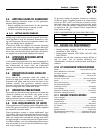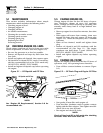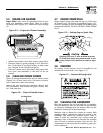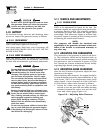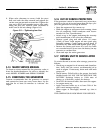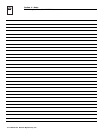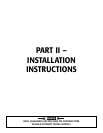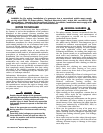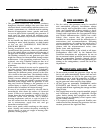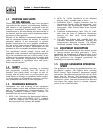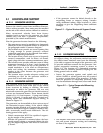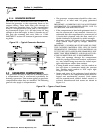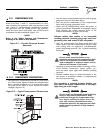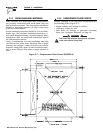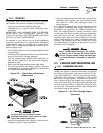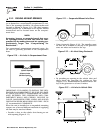
Generac
®
Power Systems, Inc. 17
ELECTRICAL HAZARDS
• The generator covered by this manual produces
dangerous electrical voltages that can cause fatal
electrical shock. Avoid contact with bare wires, ter-
minals, connections, etc., while the unit is running.
Ensure all appropriate covers, guards, and barri-
ers are in place before operating the generator. If
work must be done around an operating unit,
stand on an insulated, dry surface to reduce shock
hazard.
• Do not handle any kind of electrical device while
standing in water, while barefoot, or while hands
or feet are wet. DANGEROUS ELECTRICAL
SHOCK MAY RESULT.
• During installation onto the vehicle, properly
ground (bond) the generator either by solid mount-
ing to the vehicle frame or chassis, or by means of
an approved bonding conductor. DO NOT connect
the bonding conductor to any generator part that
might be removed or disassembled during routine
maintenance. If the grounding conductor must be
replaced, use only a flexible conductor that is of
No. 8 American Wire Gauge (AWG) copper wire
minimum.
• If the vehicle electrical circuits can be powered by
any other source of electricity (such as, a “dockside”
power receptacle), there must be no possibility of
connecting the different power sources to the vehi-
cle’s circuits at the same time. The dockside (utility)
power source must be positively isolated from the
vehicle’s circuits whenever the generator is operat-
ing. Failure to isolate the vehicle’s circuits from the
dockside power supply when the generator is run-
ning may result in damage to the generator or in
serious injury or death to dockside (utility) power
workers due to backfeed of electrical energy.
• In case of an accident caused by electric shock,
immediately shut down the source of electrical
power. If this is not possible, attempt to free the
victim from the live conductor. AVOID DIRECT
CONTACT WITH THE VICTIM. Use a noncon-
ducting implement, such as, a rope or board, to
free the victim from the live conductor. If the vic-
tim is unconscious, apply first aid, and get
immediate medical help.
• Never wear jewelry when working on this equip-
ment. Jewelry can conduct electricity, resulting in
electric shock, or may get caught in moving com-
ponents, causing injury.
FIRE HAZARDS
• For fire safety, the generator must be installed
and maintained properly. Installation always
must comply with applicable codes, standards,
laws, and regulations. Adhere strictly to local,
state and national electrical and building codes.
Comply with regulations the Occupational Safety
and Health Administration (OSHA) has estab-
lished. Also, ensure that the generator is
installed in accordance with the manufacturer’s
instructions and recommendations. Following
proper installation, do nothing that might alter a
safe installation and render the unit in noncom-
pliance with the aforementioned codes, stan-
dards, laws, and regulations.
• Keep a fire extinguisher in the vehicle at all times.
Extinguishers rated “ABC” by the National Fire
Protection Association are appropriate for use on
the recreational vehicle generator electrical system.
Keep the extinguisher properly charged, and be
familiar with its use. If there are any questions per-
taining to fire extinguishers, consult the local fire
department.
EXPLOSION HAZARDS
• Do not smoke around the generator. Wipe up any
fuel or oil spills immediately. Ensure that no com-
bustible materials are left in the generator com-
partment, or on or near the generator, as FIRE or
EXPLOSION may result. Keep the area surround-
ing the generator clean and free from debris.
• All fuel types are potentially FLAMMABLE and/or
EXPLOSIVE and should be handled with care.
Comply with all laws regulating the storage and han-
dling of fuels.
• Fuel supply lines must be properly installed, purged
and leak-tested according to applicable fuel-gas
codes, before placing this equipment into service.
There must be no possibility of fuel vapors enter-
ing the vehicle interior.
• It is required to install an approved, flexible, non-
conductive fuel line between the generator fuel con-
nection point and the rigid fuel lines.
Safety Rules
IMPACT-36 plus II Recreational Vehicle Generator



